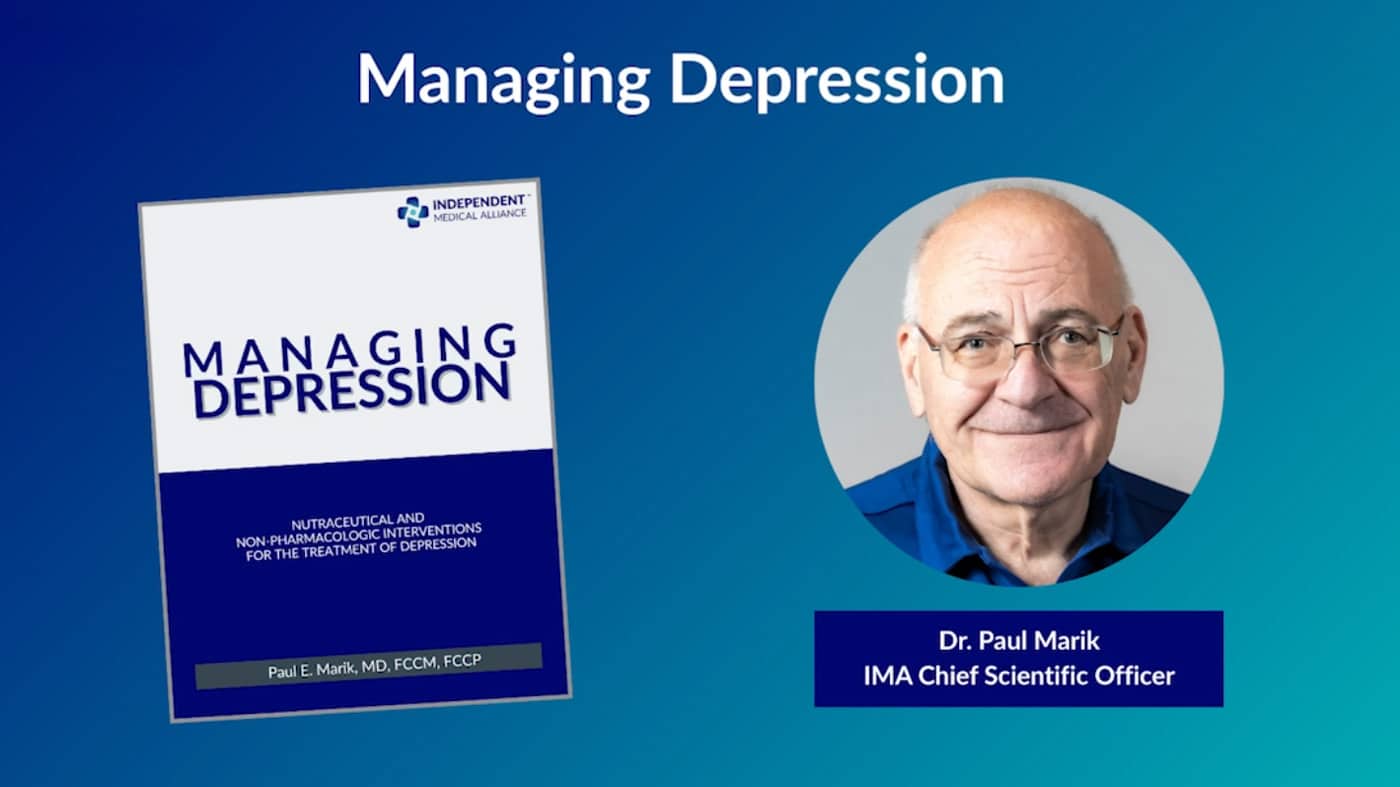Psychiatrist and IMA Senior Fellow Dr. Josef Witt-Doerring shares evidence-based, non-drug strategies to treat depression and anxiety—rooted in lifestyle and real recovery.

The mental health crisis is real. Rates of depression and anxiety have soared in the wake of the COVID‑19 pandemic, especially among young people and the elderly. And despite record levels of psychiatric prescriptions and mental health spending, outcomes are moving in the wrong direction. Suicide rates continue to climb. Disability is increasing. And many patients find themselves stuck on medications that don’t heal, but rather suppress.
What if there’s a better way?
IMA is proud to welcome psychiatrist Dr. Josef Witt‑Doerring as one of our newest Senior Fellows. A former FDA physician and pharmaceutical‑industry insider, Dr. Witt‑Doerring has spent the past five years helping patients safely taper off psychiatric medications—and reclaim their lives using natural, evidence‑backed strategies.
You may recognize him from our recent webinar on tapering off SSRIs—a powerful session that challenged conventional psychiatric narratives and offered practical tools for those trying to transition away from long‑term medication use. Now, in his first video as an IMA Fellow, Dr. Witt‑Doerring goes further, offering a hopeful roadmap for treating depression and anxiety without drugs.
▶️ Watch the full video below: Non‑Drug Approaches to Depression and Anxiety
The System is Not Working—and May Be Making People Worse.
Dr. Witt‑Doerring opens with a sobering assessment:
“In 2018, one in three women over 60 were taking a psychiatric medication.”
And yet:
- Suicide rates have climbed 61% since 2001.
- Psychiatric disability is up 47% since the 2000s.
- Mental health spending in the U.S. now exceeds $350 billion annually.
- Antidepressant use is up nearly 5x since the 1990s.
“The broader mental health system really isn’t working… You could even say it’s making people worse.”
The Chemical Imbalance Myth. “These aren’t simple conditions.”
Contrary to popular belief, the “chemical imbalance” theory of mental illness is not proven fact. In reality, there are multiple studies that disprove it.
“What we do know now is that there’s absolutely no chemical imbalance…. These aren’t simple conditions fixed by bumping up the amount of serotonin in your brain with drugs.”
It’s not hard to see why people could be convinced to take psych meds if they thought they were correcting for an imbalance. Instead of masking symptoms with medication, Dr. Witt‑Doerring invites us to rethink the whole‑body factors that contribute to mental illness—and take ownership of what we can change.
7 Non‑Drug Approaches to Depression and Anxiety
Luckily, as Dr. Witt‑Doerring makes clear in the above video, there are plenty of ways that patients can give themselves an edge over troubling conditions like depression and anxiety. Some of the simplest things are also the most potent. Below you’ll find a summary of the most effective non-drug approaches to bolster your mental health:
- Physical Activity
- High‑Quality Sleep
- High-Quality Diet
- Deep Social Connection
- Good Marriage
- Financial Security
- The Right Kind of Therapy (If Any)
1. Physical Activity
Decades of research confirm what most people intuitively know: movement is medicine. Regular physical activity reduces the risk of depression by approximately 22%, according to a 2018 meta‑analysis cited by Dr. Witt‑Doerring. And yet, many Americans remain sedentary—not by choice, but by design. Our cities, jobs, and daily routines discourage movement.
“Humans are designed to move. This is part of our physiology… It lowers inflammation. We used to walk 5 to 10 miles a day.”
Dr. Witt‑Doerring notes that unlike pharmaceuticals, exercise carries positive side effects: better blood sugar regulation, lower inflammation, improved cardiovascular function, and sharper cognition. Even modest effort (5,000–7,000 steps per day) can make a meaningful difference.
👉 Learn more: Step‑by‑Step Fitness Guide
2. High‑Quality Sleep
Sleep is another foundational pillar, yet one that’s left unaddressed. One study highlighted by Dr. Witt-Doerring concluded non-depressed people with insomnia have a twofold risk of developing depression compared to people with no sleep difficulties.
We often make the situation worse with modern habits like stimulant overuse, and matters can get worse with undiagnosed sleep apnea, or performance anxiety around sleep itself. Dr. Witt‑Doerring shares his own struggle with insomnia tied to excessive caffeine and nicotine use during his time at the FDA.
“When I stopped all the stimulants, I started sleeping like a teenager again.”
He advocates for Acceptance and Commitment Therapy for Insomnia (ACT‑I) as a powerful approach for patients caught in cycles of worry and hypervigilance around sleep. For chronic insomnia, he recommends Daniel Erichsen’s Sleep Coach School, which blends education with non‑drug interventions. Importantly, patients often improve simply by recognizing what’s disrupting their rest and giving their brains time to reset.
3. High-Quality Diet
Nutrition is a critical determinant of mental health. Dr. Witt‑Doerring cites research showing a 33% reduction in depression symptoms among those following a Mediterranean‑style diet. Diets with a lower inflammatory index yielded a 24% improvement.
“When are you going to get an effect like that? A reduction of 33%—that is absolutely huge.”
He’s quick to clarify that the solution isn’t one specific diet. What matters is reducing ultra‑processed foods, stabilizing blood sugar, and minimizing inflammatory triggers like seed oils or common allergens (gluten, dairy). He also flags the link between insulin resistance and mental‑health disorders like depression, anxiety, ADHD, and even dementia.
👉 Learn more: Eat Well: Guide to Fasting and Healthy Eating
4. Deep Social Connection
Loneliness may be one of the most potent drivers of mental illness. One meta‑analyses shows it increases the risk of depression by 2.3 times. Dr. Witt‑Doerring connects this to the breakdown of community in modern American life: reduced family ties, declining religious attendance, and geographic transience that fractures social bonds.
“We need to be helping people form real connections.”
He explains that building connection takes practice, especially for younger people raised in digital environments. In many cases, patients don’t need therapy, but rather need help learning to socialize, challenging their comfort zones, and recognizing how meaningful relationships can buffer emotional pain.
👉 Learn more: The Importance of Social Connection for Mental Health
5. Good Marriage
One of the most protective factors against depression is a strong, stable partnership. One longitudinal study show that unmarried individuals have an 86% higher risk of depression, and those who are divorced or separated face a 99% higher risk of depressive symptoms.
“If you are married you have a much lower risk of depression.”
Dr. Witt-Doerring emphasized that marriage offers more than emotional support. Marriage often brings structure, purpose, and community through shared responsibilities and connections. Of course, marital conflict is normal and that many couples simply lack the skills or guidance to work through challenges.
6. Financial Security
Money may not buy happiness, but poverty and disempowerment reliably buy depression. Studies show that happiness in the U.S. plateaus around $100,000 in annual income, and Dr. Witt‑Doerring encourages patients to consider both income potential and job structure when addressing mental health.
“If your job is high stress with no control, and you’re putting in a lot but getting a little back… that’s a recipe for depression.”
He’s especially candid about how this impacts clinicians themselves: high‑pressure jobs, limited autonomy, endless inboxes, and opaque bureaucracies are fueling physician burnout and suicidality. For patients, he recommends reevaluating work roles, seeking career coaching, and looking for paths where their efforts solve real‑world problems, not just check boxes.
7. The Right Kind of Therapy (If Any)
Dr. Witt‑Doerring offers a nuanced critique of modern therapy culture, which he says leans heavily on maternal energy (comfort, validation) but lacks paternal energy (challenge, direction). While emotional support matters, too many therapists shy away from encouraging growth, correction, or behavioral change.
Though modern therapy has it’s issues, it can still be a helpful avenue for patients to explore. Not all therapies are created equal and not all patients need therapy at all. Dr. Witt‑Doerring offers a candid rundown of common modalities:
- DBT (Dialectical Behavior Therapy): Highly structured and skill‑based. Excellent for emotional regulation and interpersonal conflict.
- ACT (Acceptance and Commitment Therapy): Useful for persistent, unavoidable problems—including insomnia, chronic illness, or anxiety.
- CBT (Cognitive Behavioral Therapy): Good for “nervous nelly” types with clean external lives but troubling thought loops.
- IPT (Interpersonal Therapy): Targeted for those in relational distress.
- Psychodynamic Therapy: Passive style, fosters insight without action.
“Sometimes, people just need encouragement to do things like change their diet… show them the evidence, and how intuitive fixing some of these things really is.”
Ultimately, the goal is empowerment—not diagnosis. Therapy may be helpful, but it should never replace the agency individuals have to rebuild their own health through tangible, evidence‑backed action.
Additional Resources from IMA
Explore more tools, studies, and expert insights to support your mental health naturally.
Understanding the Problem
- The Dark Side of SSRIs (with Laura Delano)
- Tapering Off SSRIs (Webinar with Dr. Witt‑Doerring)
- Facts About Mental Health
Natural and Emerging Evidence‑Based Solutions
These resources are free to download—but not free to create. Please support our mission to share evidence-backed medical solutions with the world by donating today.



